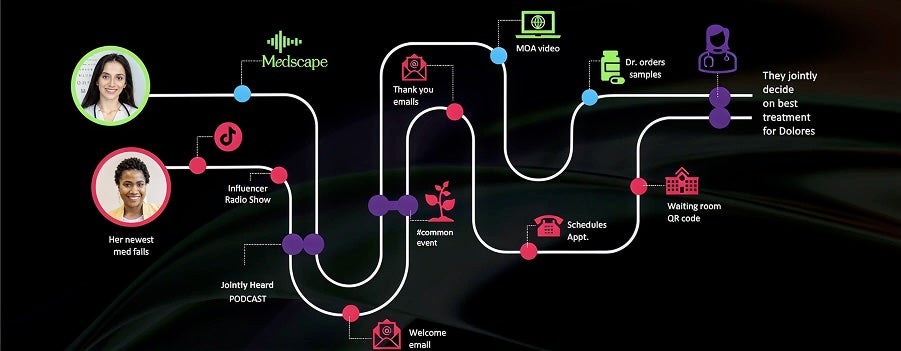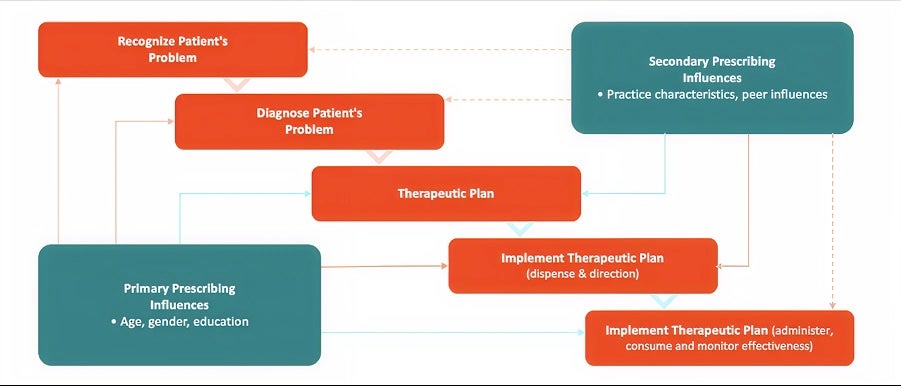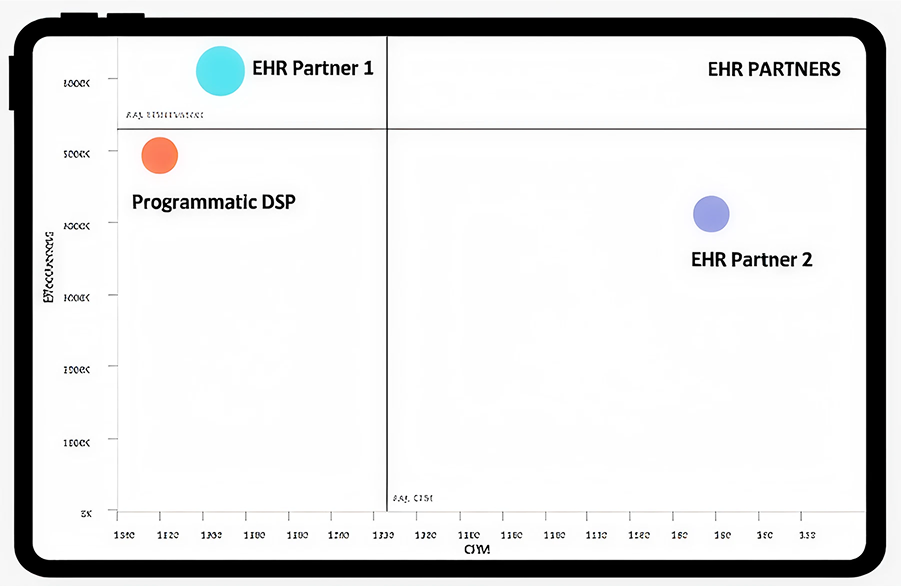Olympia Mantsios, Global VP Data & Analytics, dentsu health
Camilla Hasler, Director, Panel Business EU/UK, Borderless Access
Executive Summary
In today’s healthcare ecosystem, HCPs face increasing demands for their time, attention, and decision-making. Despite the proven link between communication quality and patient outcomes, more than one-third of HCPs are dissatisfied with their communication technologies.[1],[2] This paper explores how AI-driven solutions are reshaping HCP engagement, optimizing audience profiling and enhancing communication touchpoints, thereby improving satisfaction at both ends of the care spectrum.
By combining advanced audience research from Borderless Access and omnichannel strategy from dentsu health, we are helping healthcare brands stay ahead of change, delivering smarter insights, deeper connections, and measurable impact.
Pull Quote:
“AI in HCP communication is where electricity was in the early 1900s. It is not just a tool to replace the old, but a force that demands we reimagine the entire system. True transformation won’t come from swapping out tactics, but from reshaping how we inform, support, and engage healthcare professionals at every level.”[3]

Understanding the HCP Decision Journey
Prescribing decisions today are far from linear. Influenced by peer opinion, practice context, and brand experience, and often a highly educated and informed patient, the modern HCP journey is dynamic and has evolved into a complex interplay of touchpoints, where the brand's value to the HCP and patient needs play pivotal roles. In recent research on Oncologist Brand Awareness, Borderless Access Research showed that medical journals and publications accounted for 27% of newer Brand awareness, with conferences at 16% and colleague recommendations at 11%.[4]
Overall Key Decision Drivers:
- Patient demographics and history
- Clinical setting and specialty
- Trusted peer recommendations
- Exposure to relevant, timely brand information

Why It’s Harder to Reach HCPs Now
Healthcare professionals are:
- Overburdened dealing with complex insurance and billing systems
- Struggling with increased patient volume, patient demands and pursuit of practice efficiency. They’re time-poor. In a recent article in the Guardian, more than one-third (35%) of UK doctors said they were so tired that their ability to treat patients was impaired[5]
- Overwhelmed with content, government regulations, compliance and evolving burdens of administrative demand
- Operating in environments of strict privacy compliance wary of overt marketing and the “next best idea”
- Challenged by an aging workforce, the decline of third-party data and cookies, peer pressure and work-life balance
- a 2024 survey by RXNT found that over half of healthcare professionals reported that time constraints left little room for adopting better digital tools, leading to frustrations
The result? Traditional engagement methods are no longer enough.
The Need to Rethink HCP Communication
While patient satisfaction and engagement has long driven digital transformation in healthcare and established the business KPIs HCP satisfaction remains under-measured and underserved. Today’s professionals are overburdened by administrative tasks, digital clutter, and legacy tools that no longer reflect their operational needs.
Callout Box: Did You Know?
36% of healthcare professionals say they are dissatisfied with their current communication technologies.[6]
How AI Is Changing the Healthcare Data in 2025
AI is redefining how we engage with, understand, and serve healthcare professionals:
- Aggregates real-time data from millions of patient interactions to accurately inform diagnoses and next best action
- Flags anomalies, comorbidities, and quality issues as they emerge.
- Segments HCPs based on behavior, psychology, and performance, not assumptions.
- Delivers insights faster, supporting dynamic, timely and personalized communications
Enhancing Research Through AI
From improved data hygiene to faster analysis, AI supports a next-generation research framework:
- Synthesizes multiple data types: survey, EHR, imaging.
- Verifies participant authenticity.
- Filters, scores, and validates survey responses.
- Identifies meaningful and actionable patterns in prescribing and treatment protocol
Meeting the Challenge with AI
AI is helping marketers and researchers:
- Navigate data loss from cookie deprecation.
- Maintain trust through ethical, consent-based engagement.
- Uncover deeper behavioral insights across multiple signals.
- Measure message resonance and optimize tactics in-flight.
Callout Box: Tech in Action
Machine learning models now calibrate HCP engagement strategies in real time based on feedback loops and cross-channel data. This is applied in practice in panel engagement & across AI augmented healthcare organizations.
Building Smarter Communities
By using omnichannel AI & primary research to develop and maintain HCP and patient communities:
- Communication becomes more and more timely and relevant.
- Research becomes more flexible, collaborative, and iterative.
- Trust grows between brands and the professionals they support.
- HCP wellbeing is better supported
Case Study Highlights[7]
Case Study 1: Multitouch Optimization
A leading U.S. pharmaceutical brand was experiencing touchpoint fatigue: too many interactions, too little impact. To address this, dentsu health implemented a Multitouch Attribution Model, revealing key insights:
- Optimal Engagement Frequency: ROI peaked when HCPs were exposed to 6–7 coordinated touchpoints. Fewer than 5 yielded minimal results, while more than 7 led to diminishing returns.
- Content Delivery Strategy: Reps shared content via their app, with one slide per topic. However, call performance plateaued when content volume increased per visit. The most effective calls were short, focused, and opened with efficacy-led messaging.
- Improved ROI and Media Efficiency: Aligning media and message strategy not only increased engagement but also led to significant business outcomes.
Callout Box: Business Impact
Through more precise calibration of rep messaging and channel cadence, the brand realized multimillion-dollar revenue gains across two core levers: omnichannel optimization and field force enablement.
Case Study 2: Digital Attribution Without Identity Resolution
Using a Tableau-integrated ML model:
- Media effectiveness was measured across non-personally identifiable HCP segments.
- EHR-specific tactics were optimized by cost per impact.
- Visual tools empowered real-time scenario planning.

“No identity resolution? No problem. AI reveals who’s responding, what works, and where to invest next.”
Conclusion
AI offers healthcare brands a once-in-a-generation opportunity to transform HCP engagement, not just by improving processes, but by reimagining the entire end-to-end relationship. This transformation rests on three core pillars:
- Smarter Engagement: AI enables precise optimization of when, where, and how to engage HCPs to collect crucial data. By tailoring timing, channels, and content to individual behaviors and preferences, brands can drive higher response rates, more meaningful interactions, and ultimately better clinical and commercial outcomes.
- Ethical and Compliant Innovation: Our application of AI is grounded in consent, privacy, and global regulatory standards. Responsible use of AI doesn’t just meet compliance requirements. It builds trust, strengthens brand credibility, and creates long-term value in a highly scrutinized industry.
- Future-Ready Strategy: AI equips marketers and brand leaders to move from reactive to predictive communication. With dynamic content delivery and real-time targeting, brands can navigate a non-linear healthcare environment with agility, relevance, and impact.
These pillars, intelligent research collection and engagement, ethical implementation, and strategic foresight are redefining what’s possible in HCP communication and resetting HCP expectations around what to expect. The future is not just arriving. It’s being built. And now is the time to lead it.
[1] https://www.spok.com/news-releases/14th-annual-spok-survey-offers-insights-into-evolving-healthcare-communications-challenges-and-opportunities/?
[2] https://assets.ringcentral.com/us/report/2024-healthcare-communcation-trends.pdf?
[3] https://www.mckinsey.com/industries/life-sciences/our-insights/generative-ai-in-the-pharmaceutical-industry-moving-from-hype-to-reality?
[4] https://borderlessaccess.com/blog/oncology-healthcare-panels/
[5] https://www.theguardian.com/society/2025/mar/03/one-in-three-nhs-doctors-so-tired-their-ability-to-treat-patients-is-affected-survey-finds?
[6] https://assets.ringcentral.com/us/report/2024-healthcare-communcation-trends.pdf?
[7] dentsu health



